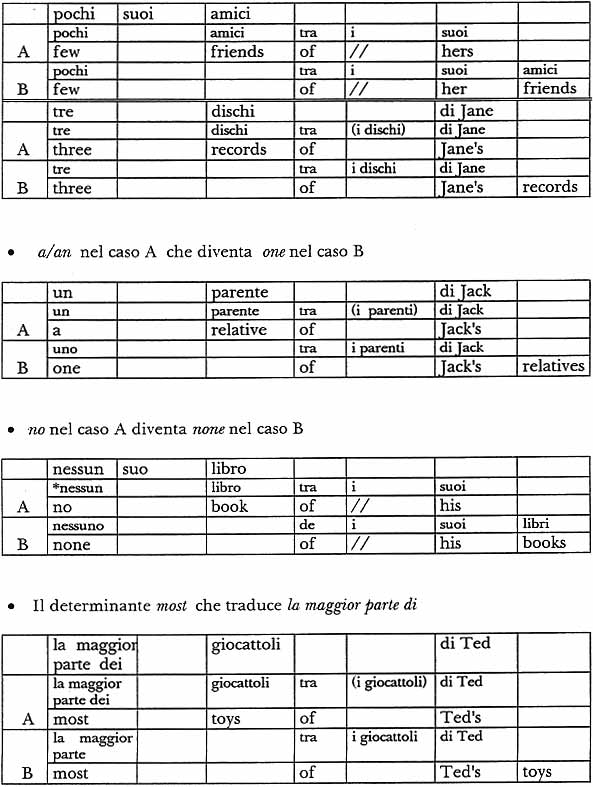
-s Genitive is chiefly used
for people or countries. Genitive is preferred for human names
(the girl’s arrival) and to a lesser extent for animal nouns
(horse’s hooves) and human group nouns
(the government’s policy).
Of is used for mass nouns,
abstract nouns (a discovery of oil, the progress of sciences),
or inanimate possessors:
• The walls of the town
• The roof of the church.
Usually genitive is preferred for people and the of-construction
for things
We say:
• the leg of a table but not a table’s
leg
• Jonh’s car but not the car of John
In general, the genitive is preferred for
the subject – verb relation and of
for the verb-object relation:
• Livingston’s discovery (Livingston discovered something
> subject – verb relation)
• The discovery of Livingston (= usually ‘Somebody discovered Livingston’
> verb-object relation)
The subject function can also be indicated by a by-phrase.
Hence the notion ‘ The army defeated the rebels’ might be expressed
in three ways:
• the army’s defeat of the rebels
• the defeat of the rebels by the army (ad opera)
• the rebels’ defeat by the army
(But ‘the rebel’s defeat of the army’ means that the rebels
defeated the army)
The of-construction is also preferred (especially
in formal English) when the modifying noun phrase is long:
• The departure of the 4.30 train for London
• But not: the 4.30 train for London’s departure
Note: genitive is preferred with time nouns and also place nouns
when followed by a superlative:
• This year’s crop
• Two weeks’ holiday (due settimane di vacanza > una vacanza
di due settimane > two weeks' holiday)
• A moment’s thought
• Today’s menu (the menu for today)
• The town’s oldest pub
• Norway’s greatest composer
• The world’s best chocolate
But also:
• A meeting of 2 days = a 2-day meeting - 4-day conference
(valore aggettivale)
• 4 days walking (una passeggiata di 4 giorni)
For + noun + sake
• For heaven’s sake
• For goodness’ sake
Double genitive
An of-phrase con be combined with an -s genitive into a double genitive. The noun with the -s genitive must be both definite and personal:
• This is an opera of Verdi's (=one of Verdi's operas <ORIGIN
RELATION ie John's email = the email from John)
• She is a friend of my wife. (=one of my wife's friends)
Unlike the simple genitive, the double genitive usually implies non-unique meaning, ie. that 'Verdi wrote several operas', and that 'my wife has several friends'.


Group genitive
In postmodified noun phrases it is necessary to add an –s genitive to
the end of the postmodification (rather than to the head noun itself)
The Chairman’s business
The Chairman of the Finance committee’s business
Someone else’s house
An hour and a half’s discussion
A week or so’s sunshine
The genitive with ellipsis
The noun modified by the genitive may be omitted if the context makes its identity clear:
• My car is fastest than John’s (John’s car)
• But John’s is a good car too.
With the of-phrase, a pronoun is normally
required
• The population of New York is greater than that of Chicago.
Omission is typical with expressions related to houses, shops, etc:
• Tonight we are going to Bill’s/the Johnsons’ (The place where they live)
Possessive adjective + gerundive
In formal English the possessive adjective is used with the
gerund. But in spoken and less formal English we very often
use the pronoun.
With ‘Stop’ the pronoun is more
usual than the possessive adjective:
I can’t stop him writing to the papers.
Nouns with gerunds:
In very formal English the possessive case is used :
• I don’t remember my mother’s complaining about prices.
But it is much more usual to omit the –s
• I don’t remember my mother complaining
Exercise 1
1. "He is obsessed by the hatred of his father"
Who hates whom?
2. "The company's decision ..."
Did the company decide something?
"The company's foundation..."
Did the company found something?
3. "The invention of the telephone by Alexander Graham Bell ..." can be expressed differently.
4. "The oldest living person in Egypt's birthday ..."
is not the student's best attempt at composition today.
What could he do to improve it?
Exercise 2

Keys 1
1. His father hates him: the SUBJECT-VERB RELATION. But it could also mean that he hates his father: the VERB-OBJECT RELATION
2. yes, the company decided: SUBJECT-VERB RELATION. No, someone founded the company: VERB-OBJECT RELATION
3. SUBJECT-VERB RELATION: "Alexander Graham Bell's invention of the telephone ..."
4."The birthday of the oldest person in Egypt..."
Keys 2
